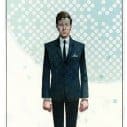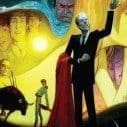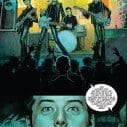Ahead of the publication of The Fifth Beatle: The Brian Epstein Story, FLUX Magazine had the opportunity to speak with writer Vivek J. Tiwary, whose research into the life of the legendary figure has taken up close to half of his own.
The entertainment entrepreneur who has worked in film, television, theatre and graphic novels, shared with us in his words discovering and bringing to the page and soon the screen, “The little known story of Brian Epstein”, working with award winning artist Andrew C. Robinson and cartoonist Kyle Baker, as well as confronting the suggestion of the film as an adaptation, and the ongoing search for a director to helm the upcoming film.
The passion Vivek possesses for the story of Brian Epstein was spoken with an energy that one could only compare to the strong brush strokes of an artist’s brush, a labour of love on his and his collaborators parts.
FLUX: To start with the obvious question, why Brian Epstein?
Vivek J. Tiwary: When I was in business school twenty one years ago I was dreaming of doing many of the things that I am doing now – being an entertainment entrepreneur. I thought I tend to be a little academic and if I’m going to be working in that sphere, I should study the lives of the great entertainment visionaries. Being a lifelong Beatles fan and seeing as The Beatles and Brian were the team that wrote and rewrote the rules of the pop music business, I decided to study the life of Brian Epstein.
I was initially looking for a business blueprint. I wanted to know how he managed the band, how he came up with the suits and the haircuts, how he got the record deal when no one wanted to sign them, and how he got Ed Sullivan to book them when no British band had made an impact in the United States. It was all of those sorts of things that I was initially after. It’s a great story, it is a largely untold Beatles story, and it’s all in the book; it’s wonderful, and it was very rewarding to me. However, it was the human side of this story which is not anything I knew anything about when I began to research that struck a chord for me.
In brief he was gay, Jewish and from Liverpool. In the 1960s those were three significant obstacles. It was against the law to be gay, and there was a lot of anti-Semitism in the UK. Liverpool was a port town where with the exception of two very important football clubs, there was really nothing going on culturally. I think if you had told someone from Liverpool in 1961 that it would one day be voted the capital of culture, they would have laughed at you.
So for this gay, Jewish man from Liverpool to run around saying, “I found a local band and they are going to be bigger than Elvis”, it was laughable. But that was his dream, and he had a real vision for it. He saw in The Beatles a group who had an important and universal message of love to share, and he believed with the right imaging and presentation, they could influence and inspire everyone. He chased that vision relentlessly until he did make it happen; until he did make The Beatles bigger than Elvis.
The answer to the question why Brian for me is about whom he was as a person, his human struggles than it is about the fact he was the guy that managed The Beatles.
FLUX: Considering your quote, “The little known story of Brian Epstein”, left me to consider how much people may know about Brian Epstein outside of the speculation and half-truths. As you say, perhaps the majority of people, even those from that era are still unfamiliar with the true Brian Epstein story.
Vivek J. Tiwary: That’s correct, and far less in the United States than in the UK. In the UK there is a more of an awareness of Brian, but if you dig into what they think they know, it is all Beatles related stuff, and that is not knowing anything about the man.
The real heart of a person’s life is where their inspiration comes from, what makes them tick, and who they love is what defines a person; not just their job.
When I began my fascination with Brian twenty-one years ago when I was in business school there was no YouTube; there were none of these online resources. There were and are no good books about Brian in print, and so when this book comes out it will be the only book in print about Brian Epstein, and so a lot of the research I had to do was tracking down the people who knew him. I read every Beatles book I could get my hands on, and I slowly put together a portrait of the people who were closest to Brian.
I was a young guy just looking for inspiration, and they were all a little wary of talking to me at first. But after they saw that my heart was in the right place, and I was really genuine and I had just been inspired by Brian’s story, and was trying to get a better handle on it, they were all willing to talk to me. They said, “You’re right. If you haven’t spoken to folks like us you don’t know the Brian Epstein story.”
When I started this project twenty-one years ago I was just looking for business inspiration, and so it was about eight years ago that I re-approached all of them and I said, “I’m not a business student anymore. I have some successful shows under my belt, and I have done some good work in the arts. The next story that I want to tell, I want it to be the Brian Epstein story.”
Really the heart of the research for this was talking to people who knew him, and in hearing the stories that they had never told before. So I think that whatever people think they may know about Brian, they don’t. They know only part of the story, or they know only half-truths and mistruths.
FLUX: You have collaborated with award winning artist Andrew C. Robinson and cartoonist Kyle Baker. Following the completion of the graphic novel, how would you reflect on the opportunity to collaborate with these two individuals?
Vivek J. Tiwary: Andrew and Kyle are both respected artists in the comic and cartoon fields. Andrew painted most of the book while Kyle just does a small sequence – a seven page sequence where the band goes to the Philippines.
You’ve seen the book so the work certainly speaks for itself. Andrew is just a fine artist, and incredibly talented at capturing emotions, and the period, from the architecture, wardrobe to the automobiles. The other great thing about working with Andrew is that he’s collaborative.
I grew up reading comics and so I’m very familiar with the comic book medium. I was one of those nerdy kids that always bought the special edition of books that included pages from the script, and so I would read the graphic novel script and compare it with the actual pages. I had a sense of how these things worked, but I’d never written a graphic novel before, and so it was also important to me to work with an artist who would be very collaborative and patient. Andrew was that guy.
Kyle Baker’s section is a period in The Beatles career where things were… The way that I looked at it is they became cartoony. They went to the Philippines and they inadvertently snubbed Imelda Marcos (first lady of the Philippines). She pulled their security and they literally had to rush out of the country on a jeep, chased by the Pilipino army. It was crazy, and whilst all this was happening America caught wind of John Lennon’s, “The Beatles are bigger than Jesus now”, and so they came back to find people burning Beatles albums in the United States.
So I thought let’s hire a great cartoonist and lets do this sequence paying tribute to the old Beatles cartoons of the 1960s. Kyle is a New Yorker and I’m a New Yorker, and just through New York circles we’ve known each other for many years. I had a feeling that he was probably a Beatles fan, and so I approached him about this and not only was he a Beatles fan, but he grew up watching those Beatles cartoons. He read the script and he loved it and so that’s how Kyle came on board.
FLUX: Bruce Cohen is producing the film adaptation of your first graphic novel, and I’ve heard reports that they are specifically looking or hoping to hire a British director. Could you offer us any insight into the upcoming film?
Vivek J. Tiwary: When I first thought about telling the Brian Epstein story, the story came to me in terms of colour palette. It starts in Liverpool in 1961, which is very dark, industrial, rainy and grey. I thought of it as very black and white. It ends in London in 1967 London, which is the birth of the summer of love, the birth of the psychedelic era, and that era is very Technicolor. But I thought of the story as the movement from black and white to Technicolor, and when you think of it in such visual terms that to me was a graphic novel and a film. Those are the two most visual of the artistic medium, and so we actually set about developing both. From the very beginning it was our intention to make both, but for a number of reasons the graphic novel took on a life of its own, but finding these two amazing artists meant we were off to the races.
Seeing as the book was finished first you can say that the film was adapted from it and it is heavily inspired by it, but really we conceived both from the very beginning. This is very important for me to point out. We respect both as different mediums, and there are entire sequences in the book that will not appear in the film, because they work on the page but they do not work on the screen. Then there are entire sequences in the film that are not in the graphic novel.
The big piece of news for the film outside of Bruce Cohen producing is that we have received the approval of The Beatles. Apple Core have signed off and we have done a deal with Sony ATV who controls the music publishing, which means we have access to The Beatles music for the film. We are literally the first film about the band in history to feature Beatles music. As you may know films like Backbeat and Nowhere Boy – there is no Beatles music in those films, because they couldn’t get the approvals. We are very proud of that, and as a result the film will be full of music sequences. Obviously the book has no audio, but it will have some music sequences.
As it is such a British story we are looking at the UK film industry, but I should say that we are not only looking at British directors. We want someone for whom the story is very personal. There is a greater likelihood of finding that with someone who is British, who lived through the sixties, and grew up with The Beatles hearing about Brian Epstein. Those folks would obviously have a more immediate connection to it, but that’s not to say we are ruling out an American director who may also have a deep connection to the story.
The Fifth Beatle: The Brian Epstein Story is published by Dark Horse, and is available to own now.
Interview by Paul Risker.









